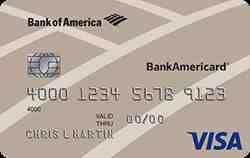Credit Cards for College Students from Bank of America
Preferred Rewards makes your credit card even better

When you enroll in the Preferred Rewards program, you can get a 25% — 75% rewards bonus on all eligible Bank of America® credit cards.
Plus, as a Preferred Rewards member, you enjoy real benefits and rewards on your everyday Bank of America® banking and Merrill investment accounts. And as your qualifying balances grow, so do your benefits.
Learn more about Preferred Rewards
Student Credit Cards 101: Everything You Need to Know
Before 2009, credit card issuers used to set up tables on college campuses, giving out free T-shirts or Frisbees if students signed on the dotted line to get a student credit card. This kind of easy access to credit was great for some, but it got many young people into debt. Financial reform mostly put an end to these practices, and students — indeed all adults under age 21 — now have a much tougher time getting approved for a credit card.

If you're ready to apply for a student credit card and begin building credit, here's what you should know.
What is a student credit card?
Student credit cards are designed to help you start building credit. They function like regular credit cards, except they tend to offer lower credit limits and little to no incentives.
You don’t necessarily have to be a student to qualify for a student credit card, depending on the issuer. But you will still have to meet eligibility requirements, depending on your age.
Age and income requirements
IF YOU'RE UNDER 21
It is technically possible to get a credit card on your own, but issuers will require you to have an independent income, which most college students do not have. If you're under 21 and don't have your own income, you will need a parent or another trusted adult to co-sign for you on a credit card application.
IF YOU'RE OVER 21
Credit card restrictions are not as tight once you pass your 21st birthday. You'll still need to demonstrate that you have income, because issuers want to know that you can pay back what you spend. But you can include any income to which you have reasonable access, such as the income of a partner or spouse.
